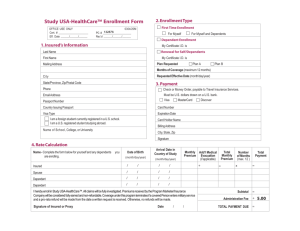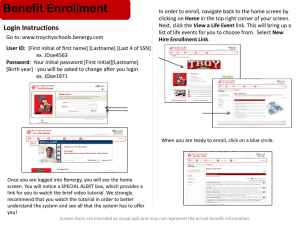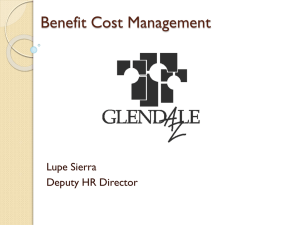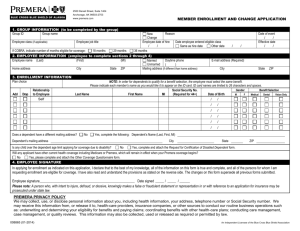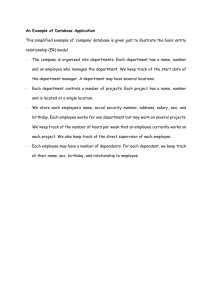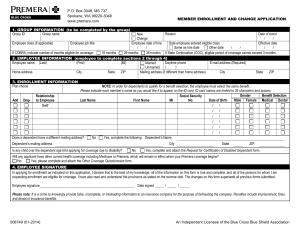March 2 Minutes - University of Alaska System
advertisement
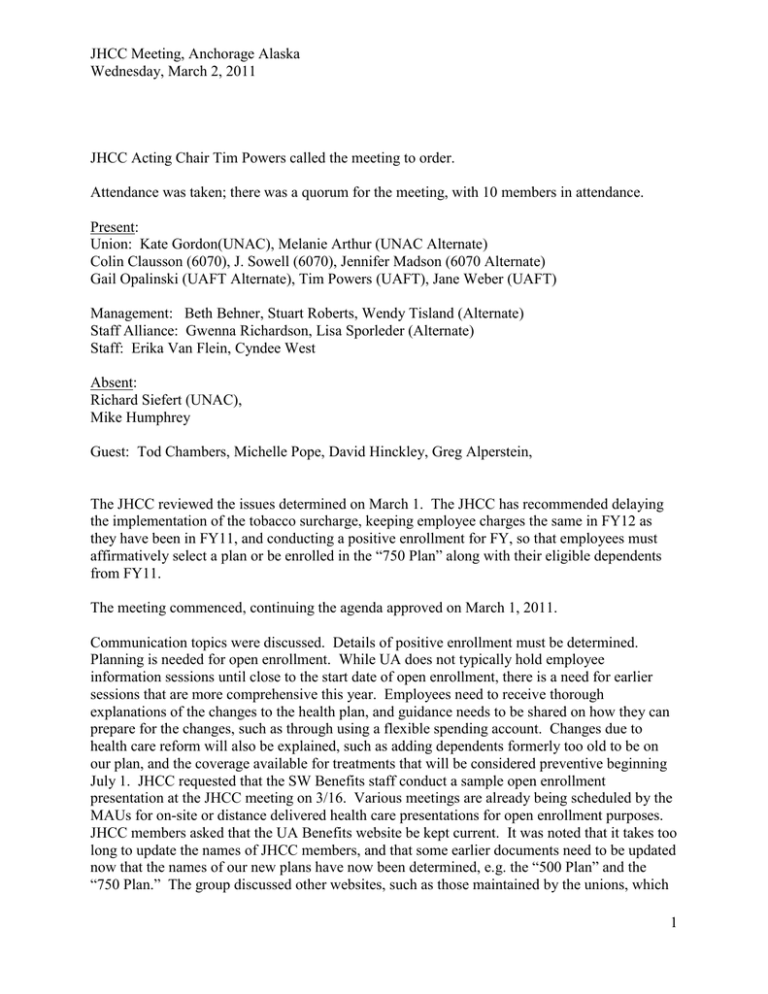
JHCC Meeting, Anchorage Alaska Wednesday, March 2, 2011 JHCC Acting Chair Tim Powers called the meeting to order. Attendance was taken; there was a quorum for the meeting, with 10 members in attendance. Present: Union: Kate Gordon(UNAC), Melanie Arthur (UNAC Alternate) Colin Clausson (6070), J. Sowell (6070), Jennifer Madson (6070 Alternate) Gail Opalinski (UAFT Alternate), Tim Powers (UAFT), Jane Weber (UAFT) Management: Beth Behner, Stuart Roberts, Wendy Tisland (Alternate) Staff Alliance: Gwenna Richardson, Lisa Sporleder (Alternate) Staff: Erika Van Flein, Cyndee West Absent: Richard Siefert (UNAC), Mike Humphrey Guest: Tod Chambers, Michelle Pope, David Hinckley, Greg Alperstein, The JHCC reviewed the issues determined on March 1. The JHCC has recommended delaying the implementation of the tobacco surcharge, keeping employee charges the same in FY12 as they have been in FY11, and conducting a positive enrollment for FY, so that employees must affirmatively select a plan or be enrolled in the “750 Plan” along with their eligible dependents from FY11. The meeting commenced, continuing the agenda approved on March 1, 2011. Communication topics were discussed. Details of positive enrollment must be determined. Planning is needed for open enrollment. While UA does not typically hold employee information sessions until close to the start date of open enrollment, there is a need for earlier sessions that are more comprehensive this year. Employees need to receive thorough explanations of the changes to the health plan, and guidance needs to be shared on how they can prepare for the changes, such as through using a flexible spending account. Changes due to health care reform will also be explained, such as adding dependents formerly too old to be on our plan, and the coverage available for treatments that will be considered preventive beginning July 1. JHCC requested that the SW Benefits staff conduct a sample open enrollment presentation at the JHCC meeting on 3/16. Various meetings are already being scheduled by the MAUs for on-site or distance delivered health care presentations for open enrollment purposes. JHCC members asked that the UA Benefits website be kept current. It was noted that it takes too long to update the names of JHCC members, and that some earlier documents need to be updated now that the names of our new plans have now been determined, e.g. the “500 Plan” and the “750 Plan.” The group discussed other websites, such as those maintained by the unions, which 1 JHCC Meeting, Anchorage Alaska Wednesday, March 2, 2011 could post links to the SW Benefits web page. The dates of Open Enrollment this year will be April 15 through May 16, 2011, for changes that will go into effect July 1, 2011 (FY12). Erika VanFlein stated that she will work on updating the Plan document. Now that the committee has made recommendations, the Administration will be able to finalize the plan details, which will include the employee charges. Erika noted that Caremark does targeted mailings regarding changes to pharmacy coverage to particular employees who will be affected. JHCC members asked that a glossary of health care terms and acronyms be posted on the UA Benefits website, so that employees will have a better understanding of terms and of the issues that affect them. Scenarios of how family members could meet the required family deductible could be provided, to make issues like this less confusing. Tobacco cessation program information needs to be disseminated widely, along with the rules on how long a person must be tobacco free in order to avoid the charge in FY13. JHCC members brought up other issues that they found confusing, such as how Alere determines that an employee or dependent is eligible for the disease management program. Tim Powers was informed that 2 emergency room visits were required before an individual with high blood pressure would be considered eligible for UA’s disease management program run by Alere as our vendor. Cyndee suggested that JHCC prepare a communication regarding its recommendations at the March 1-2 meetings and that the committee make it a positive message, emphasizing the reasons for the recommendations made. Following a break, the JHCC discussed the role of JHCC members during open enrollment meetings. The consensus was that it would be valuable for JHCC members to attend these meetings, to share their points of view and to be available to receive input from employees who attend. A JHCC member asked whether JHCC meetings were open to the public. Jenn Madsen responded yes, during presentations. But for deliberation and voting processes, the meetings are attended by JHCC members only. A question was asked whether the Staff Health Care Committee (SHCC) would go away if the union tentative agreements are ratified. Currently, UA and UNAC have a tentative agreement that specifically references membership on JHCC by two staff members appointed by Staff Alliance. A general discussion occurred on the pros and cons of having two parallel committees. The SHCC is a representative group that offers communication, input, discussion and education of staff regarding health care issues. Currently, SHCC makes recommendations to UA’s administration, but perhaps this committee could make its recommendations to Staff Alliance. Lisa Sporleder noted that SHCC hasn’t met with Lockton or been involved in employee rate setting. Before SHCC was created, Staff Alliance made recommendations directly to the UA administration. Stuart Roberts noted that the JHCC makes recommendations for all employees 2 JHCC Meeting, Anchorage Alaska Wednesday, March 2, 2011 of the University, whereas the SHCC provides input from a broad group of staff employees across the system. Both committees advise the university on health care issues, from their perspectives. JHCC members questioned whether the existence of a separate Staff Health Care Committee making recommendations diluted the recommendations of the JHCC, which will now have formal representatives from Staff Alliance. Lisa and Gwenna agreed to discuss with Staff Alliance whether having 2 formal seats on JHCC would allow sufficient input for staff at JHCC that any staff recommendations could be raised at JHCC meetings for consideration, to better dovetail the committee processes. Update on Dependent Audit Erika gave an update on the dependent audit. We are now at a 77% response rate. 1554 employees with dependents have “complete status,” meaning that all of their documents have been verified and are found acceptable to show eligibility. An additional 99 employees have incomplete status. 546 employees have documents being reviewed. There are 657 employees with listed dependents who have not responded to the audit. There have been 12 self disclosed ineligible dependents, who are being removed from coverage. Beth Behner explained that any dependents who are found ineligible by ConSova will be separately reviews by SWHR before any dependents are involuntarily taken off of the plan. The University will make the decision on removal from the plan, not the vendor. March 31, 2011 would be the earliest date for retroactive removal from the plan for any dependents who are determined ineligible by UA at the conclusion of the process. ConSova usually has a sequence of allowing an appeal after the initial determination of ineligibility and removal of dependents from the plan, so that employees realize the importance of complying with the audit and providing necessary documents. The appeal process is not a different type of review process. Dependents are then retroactively reinstated if documents are submitted that demonstrate eligibility. This process will be modified for the UA dependent audit, so that UA makes the final determination of eligibility at the end of the process before any dependents are removed. Melanie Arthur asked a question from a faculty member concerning ConSova’s credentials for conducting an internal audit. Beth explained that the university considers ConSova fully qualified to review and verify eligibility of dependents. UA has received similar questions and has explained that UA is not granting exceptions to employees who wish to object to ConSova’s qualifications or object to participating in the audit for other reasons. All employees with dependents must participate in the audit if they wish to keep their dependents on the plan. Beth indicated that any employees who write to the University stating that they are not responding due to an objection to the process will receive a response letter from the University. Some employees have asked ConSova to provide them a copy of an “SAS 70” report. This is a type of audit report that firms such as ConSova receive from an independent audit company concerning their procedures and security safeguards. Beth requested a copy of this audit report on ConSova from Lockton and the University will review its contents. Another question has come up regarding the destruction of digital documents. This question has been covered by CITO Steve Smith’s memo, which is posted on the UA Benefits website and confirms the appropriateness of security safeguards in ConSova’s process and electronic transmissions. 3 JHCC Meeting, Anchorage Alaska Wednesday, March 2, 2011 Following a lunch break, the JHCC meeting resumed. The group discussed the motion made by Rich Seifert, that was tabled in the meeting the day before. Jenn Madsen stated that employers who are self insured may pool their group with others. Some network savings and economies of scale might be achieved. However, it is her understanding that we’d then have to buy an insurance policy to provide health care. We would need to be careful that we did not take in other groups with more risk than our own population. Stuart recommended that Mike Humphrey contact the State of Alaska and ask them whether they have considered this type of pooling approach, and whether they could share information with UA on the SOA claims costs. The JHCC discussed the presentations by vendors, to receive information on issues of interest. For example, WIN has not updated JHCC on how their new weight program has been going. Also, since we are implementing Best Docs, we may want to invite that vendor in to discuss implementation, communications and employee referrals. $300,000 Wellness Incentive Funds Wendy Tisland had distributed a draft form to all JHCC members, that could be used to inform employee groups how to apply for funds for various wellness incentives and challenges. A subcommittee of the JHCC, composed of Wendy, Cyndee West and Gwenna Richardson, has been meeting to pursue the funding of incentive efforts that campuses, departments and various employee groups apply to sponsor. They have proposed conducting a pilot process for extended sites to see how this would work. To get the word out on this pilot, Gwenna will communicate with staff, Cyndee will communicate with the unions, and Wendy will communicate with management employees. The subcommittee will review and approve applications. A limit of $500 per person will be enforced. Michelle Pope noted that any events and incentive offerings must be completed before the end of the fiscal year, in order to use FY11 funds. Processing time must be allowed. Kate moved to give authority to the subcommittee to finalize the form so that there can be a pilot at the extended sites implemented as soon as possible. Jenn seconded. Motion carried. The JHCC again discussed planning for communications and meetings related to open enrollment and health care plan changes. JHCC members who noted their willingness to participate in employee meetings included Lisa, Tim, Gwenna, Kate and Melanie. UA will prepare drafts of open enrollment communications and send them to JHCC for review and comment. Erika will work on revisions to the current drafts Lockton has been working on, and will share them with JHCC members. 4 JHCC Meeting, Anchorage Alaska Wednesday, March 2, 2011 The JHCC Meeting dates are set for the next few months. The time of the meetings will be 10AM to Noon on March 16, April 20, May 18, Jun 15, Jul 20. Beth moved to adjourn. Kate seconded. Motion carried. The meeting adjourned at p.m. Submitted by: _______________________ Beth E. Behner _______________________ Date 5
